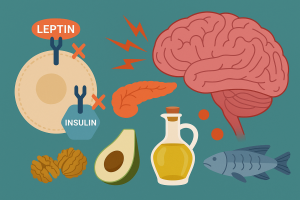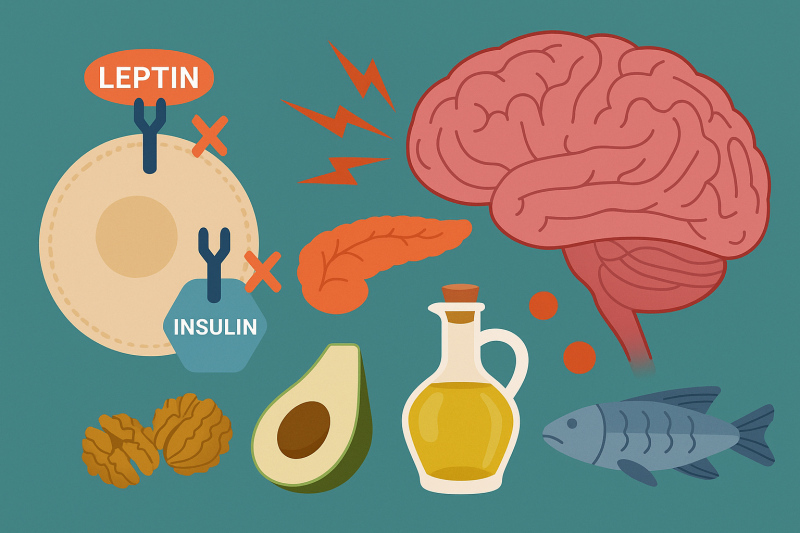
Figure 1: Illustrates how brain inflammation contributes to leptin and insulin resistance, with unsaturated fats helping to reduce inflammation and improve metabolism. Created by Sharleen Mtesa.
We’ve all heard the saying “you are what you eat,” but when it comes to hormones like insulin and leptin, that couldn’t be more true. These two messengers have a big job: insulin helps manage your blood sugar, and leptin tells your brain when you’re full. These two hormones play a critical role in keeping our metabolism on track. And when they’re working properly, they help us maintain a healthy balance between hunger and energy.
But when our diets are high in processed foods, unhealthy fats, and sugar, these hormones can stop functioning correctly. That’s when insulin and leptin resistance kicks in leading to constant cravings, weight gain, and blood sugar issues.
Therefore, incorporating healthy unsaturated fats into your diet like those found in olive oil, avocados, nuts, and fatty fish can be a game-changer. These fats help reduce inflammation, improve hormone sensitivity, and support your body’s ability to manage hunger and energy more effectively. Let’s take a closer look at how these fats actually work to restore balance and boost your health.
How Inflammation Disrupts Insulin and Leptin Resistance.
According to the paper “Hypothalamic Inflammation in Obesity and Metabolic Disease,” a high-fat diet (HFD) triggers inflammation in the hypothalamus, impairing how the brain responds to key hormones like insulin and leptin. This inflammation leads to insulin resistance, which makes it harder for the body to manage blood sugar, and leptin resistance, which disrupts the brain’s ability to signal when you’re full, ultimately increasing hunger and food intake.[1]
The inflammatory process involves the activation of proinflammatory cytokines, like TNF-α, that interfere with insulin and leptin signaling. This damage to hormone function results in metabolic imbalances, weight gain, and constant cravings. These effects on hunger and energy regulation create a vicious cycle, making it harder to maintain a healthy weight and manage blood sugar levels
How Unsaturated Fatty Acids Help Reverse Insulin and Leptin Resistance.
Unsaturated fatty acids, particularly monounsaturated fats (MUFAs) and polyunsaturated fats (PUFAs), play a very important role in restoring metabolic balance. These healthy fats not only help with weight control but also improve the body’s response to insulin and leptin by reducing inflammation and promoting fat metabolism.
- Monounsaturated fats (MUFAs): Found in olive oil, nuts, and avocados.
- Polyunsaturated fats (PUFAs): Especially omega-3s and omega-6s, found in fatty fish, flaxseeds, and walnuts.
1. Improving Insulin Sensitivity.
Insulin helps cells absorb glucose from the blood, but when the body becomes resistant, blood sugar levels rise, contributing to type 2 diabetes. Unsaturated fats aid in restoring insulin sensitivity in the following ways:
- Better Cell Membrane Function: Unsaturated fats become part of cell membranes, making them more flexible and fluid. This improves insulin receptor function, allowing glucose to enter cells more efficiently.
- Reduced Inflammation: Chronic inflammation, often caused by a diet high in saturated fats and processed foods, disrupts insulin signaling. Omega-3s have powerful anti-inflammatory effects, reducing inflammation and improving insulin function. These omega-3s help calm the immune system, prevent activation of inflammatory receptors, and reduce the production of TNF-α, a cytokine that contributes to insulin resistance.
- Fewer Toxic Fats in Organs: Excess fat storage in organs like the liver and muscles leads to insulin resistance (lipotoxicity). Unsaturated fats help reduce fat accumulation and promote healthy fat metabolism, encouraging the body to use fat for energy instead of storing it in organs. For example, oleic acid (found in olive oil) and omega-3s help reduce diacylglycerol (DAG) buildup in the liver, which is linked to insulin resistance.
- Gene Regulation: Unsaturated fats activate proteins (like PPARs) [2] that regulate how the body uses sugar and fat, improving glucose control and reducing fat storage.
Figure 2: Insulin Signaling Pathway
This figure shows how insulin activates signaling pathways like PI3K/Akt and MAPK to promote glucose uptake, glycogen synthesis, and cell growth, while SOCS proteins regulate the response through negative feedback.[3]
2. Restoring Leptin Sensitivity
Leptin is produced by fat cells and signals the brain when you’re full. However, in leptin resistance, the brain doesn’t respond, leading to overeating and fat storage. Unsaturated fats help restore leptin sensitivity by:
- Calming Brain Inflammation: High-fat, high-sugar diets cause inflammation in the brain, especially in the hypothalamus, where leptin acts. Omega-3s help reduce this inflammation, allowing leptin signals to reach the brain effectively.
- Helping Leptin Cross the Blood-Brain Barrier: Leptin travels from the blood to the brain across the blood-brain barrier. Chronic inflammation can disrupt this process. Omega-3s help improve blood-brain barrier function, enabling leptin to reach the brain more efficiently.
- Improving Leptin Signaling: Unsaturated fats support better leptin receptor function and reduce the expression of SOCS3, a protein that blocks leptin signaling. As a result, the brain can detect leptin properly, helping to reduce hunger and cravings.[4]
Figure 3: Overview of Leptin Signaling Pathway.
This figure shows the leptin signaling pathway, where leptin activates JAK2, leading to phosphorylation of key sites (pY985, pY1138) and triggering downstream signals like STAT3, PI3K, and ERK. These pathways regulate hunger and energy balance, with SOCS3 acting as a feedback inhibitor.[5]
Feed Your Hormones Right.
When it comes to balancing your metabolism, hormones like insulin and leptin are key players and what you eat has a huge impact on how well they work. Chronic inflammation from highly-processed foods and unhealthy fats can throw these systems off, leading to cravings, weight gain, and blood sugar spikes.
But the good news? Healthy unsaturated fats like those found in olive oil, avocados, nuts, and fatty fish can help reset the system. By calming inflammation, improving hormone signaling, and supporting better fat metabolism, these fats make it easier for your body to respond to hunger and energy cues the way it’s supposed to.
So instead of fearing fat, focus on the right kinds. A few smart swaps in your daily meals can go a long way in supporting hormone health, boosting energy, and helping you feel your best from the inside out.
Footnotes
[1] Jais, A., & Brüning, J. C. (2017). Hypothalamic inflammation in obesity and metabolic disease. The Journal of clinical investigation, 127(1), 24–32. https://doi.org/10.1172/JCI88878
[2] Varga, T., Czimmerer, Z., & Nagy, L. (2011). PPARs are a unique set of fatty acid regulated transcription factors controlling both lipid metabolism and inflammation. Biochimica et biophysica acta, 1812(8), 1007–1022. https://doi.org/10.1016/j.bbadis.2011.02.014
[3],[5] Howard, J. K., & Flier, J. S. (2006). Attenuation of leptin and insulin signaling by SOCS proteins. Trends in Endocrinology & Metabolism, 17(9), 365–371. https://doi.org/10.1016/j.tem.2006.09.007
[4] Park, H. K., & Ahima, R. S. (2014). Leptin signaling. F1000prime reports, 6, 73. https://doi.org/10.12703/P6-73


